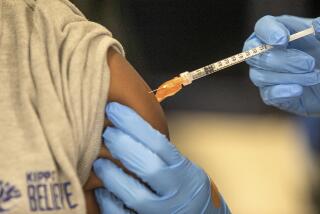Swine flu vaccine caused slight risk of Guillain-Barre syndrome
- Share via
The vaccine that protects against influenza A (H1N1), commonly known as swine flu, caused no increase in birth defects when given to pregnant women but did produce a very small increase in the risk of Guillain-Barre syndrome when given to people older than 50, according to two new studies reported Tuesday. Overall, the studies show that the vaccination campaign conducted against the pandemic of the winter of 2009-10 was very safe.
Pregnant women and the elderly, along with young children, are among those who are most susceptible to the swine flu, and to influenza in general. Those groups are thus given priority for vaccination, but there has been some concern about possible side effects of the vaccines that were used. An estimated 2.4 million pregnant women were vaccinated in the United States. The U.S. vaccine consisted of surface antigens from the H1N1 virus. The vaccine used elsewhere, such as in Denmark and much of Europe, used the same antigens but also contained what is known as an adjuvant to boost immune stimulation by the antigens. There have been concerns about the safety of such adjuvants.
Dr. Bjorn Pasternak of the Statens Serum Institut in Copenhagen and his colleagues used Danish medical records to study all infants born between Nov. 2, 2009, and Sept. 30, 2010, a total of 53,432 infants. About 13.1% of those, 6,989, were born to mothers who had received the swine flu vaccine during pregnancy.
The team reported in the Journal of the American Medical Assn. that they found no statistical difference in the incidence of birth defects or fetal deaths in children of vaccinated mothers compared with children of mothers who were unexposed.
In an independent study reported in the same journal, Dr. Philippe De Wals of Laval University in Quebec City, Canada, and his colleagues examined medical records in provincial hospitals for the period from October 2009 through March 2010, when 4.4 million Canadians were vaccinated using the non-adjuvanted vaccine. They found 83 confirmed cases of Guillain-Barre syndrome, including 25 among people who had received the vaccine. Guillain-Barre syndrome is characterized by rapidly developing muscle weakness and the loss of reflexes, and is thought to be an autoimmune disorder triggered by external stimuli. An increase of the syndrome was linked to the 1976 vaccination program against that year’s form of swine flu, but links to subsequent vaccination programs have been ambiguous and controversial.
The team found that the number of cases of the syndrome linked to vaccination in 2009-10 was about 2 per 1 million doses of vaccine, and the excess risk, about an 80% increase, was observed only in those older than 50. They also found that the risk of hospitalization for flu following a documented A1N1 vaccination was 1 per 2,500 and the incidence of death was 1 per 73,000. “The H1N1 vaccine was very effective in preventing infections and complications,” the team wrote. “It is likely that the benefits of immunization outweigh the risks.”
LATimesScience@gmail.com
Twitter/@LATMaugh






